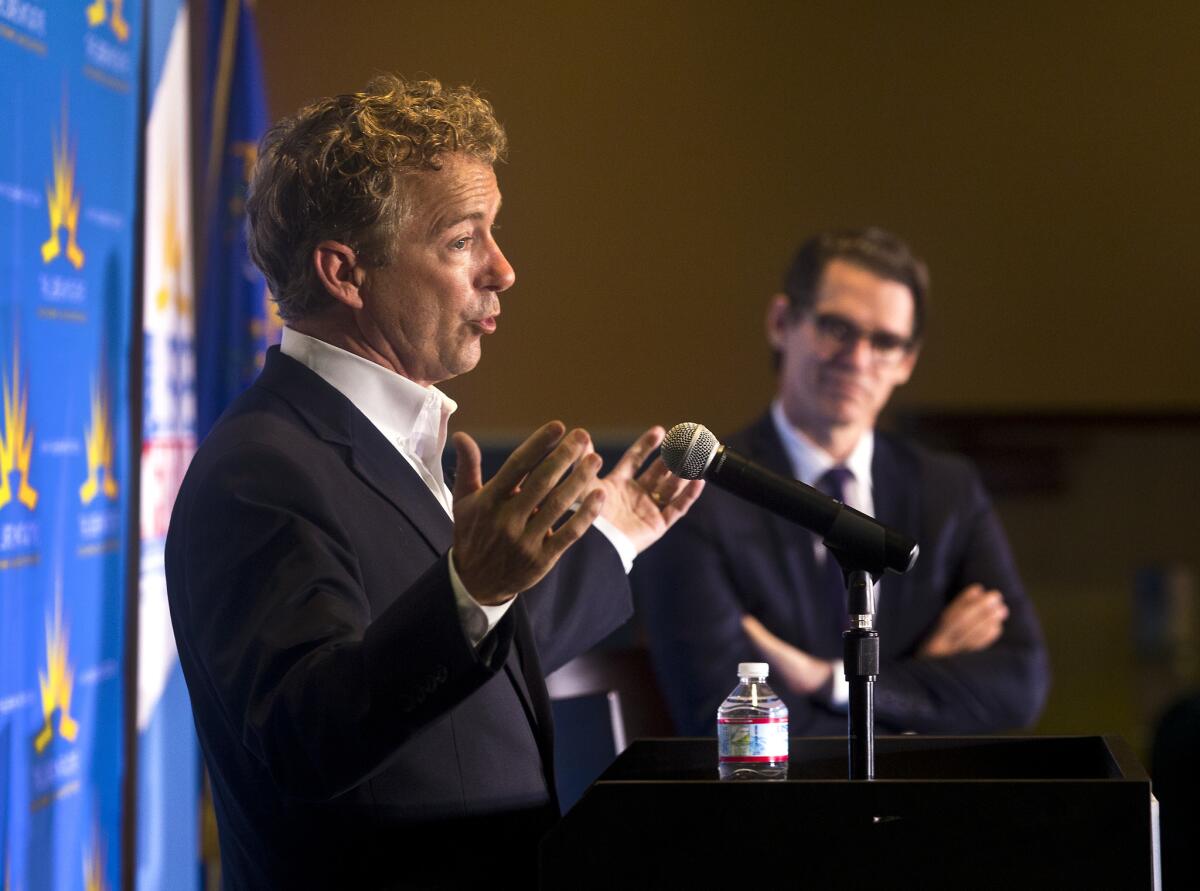Libre Initiative, backed by the Koch brothers, tries to lure Latinos to GOP

U.S. Sen. Rand Paul (R-Ky.) makes a point on stage as the Libre Initiativeâs executive director, Daniel Garza, listens during a speech in Las Vegas.
For much of the last decade, national Republicans have grappled with how to court Latino voters.
Time and again the party has failed -- leading pundits to offer insights and postmortem analyses about how the GOP can become more inclusive.
Now, efforts are falling to outside groups, such as the Libre Initiative, bankrolled by the conservative billionaire Koch brothers.
Several Republican presidential hopefuls have visited with Libre leaders, and former Florida Gov. Jeb Bush will be the latest, as he is set to address the group at a forum in Las Vegas on Wednesday night.
The influence of groups such as Libre, which as a 501(c)4 nonprofit can raise unlimited amounts of money and does not have to disclose its donors, could have an influence on the 2016 election with about 28 million Latinos eligible to vote.
Here is some background on the Libre Initiative:
When was it created?
It was formed in 2011 and has field staff in several states, including California, Colorado and Florida. Its executive director, Daniel Garza, served in George W. Bushâs administration as deputy director of External and Intergovernmental Affairs in the Interior Department. Other members include field directors and data analysts.
Why was it created?
Republicans have had trouble capturing the support of Latino voters, not just in presidential elections, but in congressional and gubernatorial contests.
During recent elections, Latinos have tilted heavily toward Democrats -- supporting Barack Obama over his GOP challengers by wide margins in 2008 and 2012.
In Nevada, where Bush will speak Wednesday, Latinos have increased turnout since 2004, when they registered at 10% of the electorate, to 15% in 2008 and 18% in 2012, according to a study by the nonpartisan Pew Research Center. Obama carried nearly 70% of the Latino vote in Nevada in 2012.
The Koch brothers aim to woo Latinos by promoting principles of economic freedom and limited government.
What is the group doing to reach out to Latinos?
In Nevada, the group has helped Latinos -- some in the country illegally -- pass driverâs license tests, and in other states, the group has held back-to-school events for lower-income families. Democrats have criticized the efforts as disingenuous and that the policies the group supports are not in the best interests of Latinos.
What are key issues of concern to the group?
Libre stresses more emphasis on state and local officials driving education policy and not the federal government. The group opposes Common Core, the national education standards being implemented in dozens of states (Bush is a supporter).
On immigration -- a hot-button issue that has created a strong divide in the 2016 GOP primary -- Libre calls for children brought into the country illegally by their parents to be granted legal status. On its website, the group calls for âimplementing a robust employment-driven policy where free market demand drives the quantity of available worker visas and will discourage unauthorized immigration.â
Who has spoken at a Libre forum?
During October -- which is Hispanic Heritage month -- U.S. senators Marco Rubio of Florida and Ted Cruz of Texas have spoke before the group. U.S. Sen. Rand Paul of Kentucky has also addressed the group.
Follow @kurtisalee on Twitter for political news.
MORE POLITICAL NEWS
Grief over son kept Joe Biden and family from committing to longtime aspiration to presidency
Paul Ryan appears to firm up votes for speakerâs bid, though GOP divisions remain
Even with rising debt and sinking polls, candidates find dropping out is hard to do
More to Read
Get the L.A. Times Politics newsletter
Deeply reported insights into legislation, politics and policy from Sacramento, Washington and beyond. In your inbox three times per week.
You may occasionally receive promotional content from the Los Angeles Times.











